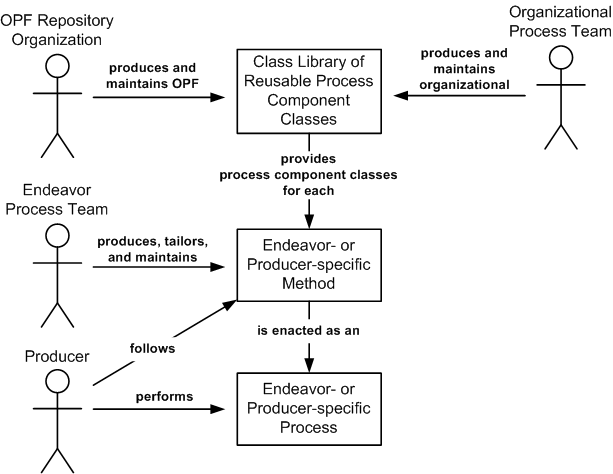Method Construction Guidelines
The OPEN Process Framework (OPF) recognizes that no two
endeavors are exactly alike. Endeavors vary greatly in
objectives, size, scope, complexity, criticality, and
application domain. They also vary in terms of available
schedule, resources, technology, and organizational culture.
Therefore, no single method, no matter how
tailorable, will be optimal for all endeavors. Thus, the
OPEN Consortium of methodologists, developers, tool vendors,
and academics has produced a process
framework rather
than an individual method. In a sense, OPF is not a
development method, but rather an industry-standard method
for producing methods that meet the differing
needs of specific endeavors.
OPF contains a class library of free, open-source, reusable
method components
that is so large and complete that all of its process component classes are not needed on any single
project or even a
program
of related projects, no matter how large and complex it might be. Instead, only appropriate
cost-effective process component classes are selected and tailored via subclassing to produce a
method (a.k.a., process model) that is
appropriate for the specific needs of the individual
endeavor (e.g., enterprise, program, project) or
producer (e.g., organization, team, role, tool).
This framework is stored in the OPF repository of reusable process component classes.
As illustrated in the preceding figure:
- The OPEN Process Framework Repository Organization (OPFRO)
constructs, extends, and maintains the free, open source, OPEN class library of core
reusable process component classes (i.e., process metamodel),
which is stored in the OPEN Process Framework (OPF) repository.
- An organizational process team can also produce its own repository containing
an organization class library of reusable process components, using the official OPF
class library as a starting point.
- The endeavor process team then creates an endeavor-specific method by>
- Selecting the relevant process component classes to reuse.
- Optionally tailoring these process component classes via subclassing to
add new contents, modify existing contents, delete unnecessary contents, and ensuring
referential integrity of the resulting classes.
- Integrating the resulting process component classes into a consistent process model (i.e., method).
- The producers (i.e., organizations, teams, roles, persons, and tools) follow the method to
perform the resulting process (i.e., enacted method).
To produce an endeavor-specific or producer-specific method, the following
teams typically perform the following
tasks iteratively and incrementally in roughly the following
order:
- Resource Management.
The endeavor’s management team (e.g.,
program management team or
project management team)
staffs the endeavor’s
process team.
- Method Needs Assessment.
The process team assesses the specific process needs of the endeavor or producer.
- Method Construction.
The process team constructs an appropriate endeavor-specific method by:
- Selecting appropriate reusable process component classes from the repository
of reusable process component classes.
- Tailoring (via subclassing) the selected process component classes to better meet the specific needs of the endeavor or producer.
- Integrating the tailored process component classes into the resulting method.
- Method Documentation.
The process team documents the endeavor’s method
in the associated
process description document and
conventions.
- Training Delivery.
The training team
provides appropriate training to both the endeavor staff and the customer organization in all aspects
of the endeavor process.
- Method Mandating.
The endeavor management team formally mandates the use of the endeavor method.
- Method Consulting.
The process team supports the endeavor staff by answering process questions and mentoring staff members.
- Quality Assurance.
The endeavor’s staff and quality team
continuously evaluate the effectiveness of the process in terms of work product quality and staff
efficiency. Upon completion of the endeavor, they also capture process lessons learned.
- Process Framework Maintenance.
The process team continuously iterates the organizational process framework based on actual usage,
technological advances, and academic research. This may include adding, deleting, or modifying process components
classes.

